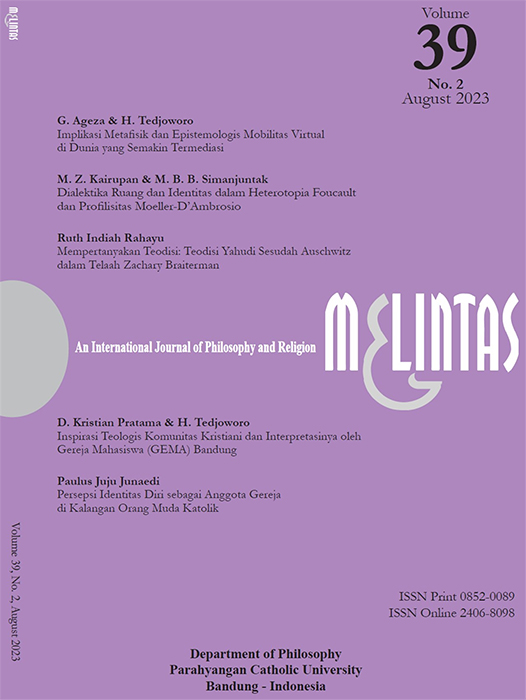Dialektika Ruang dan Identitas dalam Heterotopia Foucault dan Profilisitas Moeller-D’Ambrosio
DOI:
https://doi.org/10.26593/mel.v39i2.7779Keywords:
heterotopia, profilicity, spatio-temporal identity, second-order observation, human identity and profileAbstract
This study aims to explore the interplay between space and the construction of identity. It employs descriptive library research methodology to elucidate the elements and aspects of both space and identity. It draws upon Michel Foucault’s concept of heterotopia for the understanding of space and the theory of profile formulated by Hans-Georg Moeller and Paul J. D’Ambrosio. The analysis delves into these theories and their interrelation concerning identity formation. The authors conclude that from Foucault's perspective, space can be seen as having distinctive characteristics, tied to axio-ontological components that need to be fulfilled before entering a heterotopic space. This position is then intersected with Luhmann’s second-order observation, resulting in a dynamically linked profilic identity to a particular space. This paper finds that in Foucault’s thinking, heterotopia emphasises the impossibility of space being separated into a label. Space as a site (“cultural framework”) may still be enforced by designing it to fulfill certain functions. As a consequence, it becomes increasingly difficult for these spaces to be seen as relevant to society’s way of being today. In the light of Foucault and Moeller-D’Ambrosio, the space now needs to be seen as a form of space (espace–a referential frame) that is profilic.
Downloads
Published
Issue
Section
License
Copyright (c) 2024 Melvyn Zaafir Kairupan, Mardohar Batu Bornok Simanjuntak

This work is licensed under a Creative Commons Attribution-NonCommercial 4.0 International License.
MELINTAS applies the Creative Commons Attribution (CC BY NC) license to articles and other works we publish. If you submit your paper for publication by MELINTAS, you agree to have the CC BY NC license applied to your work.


